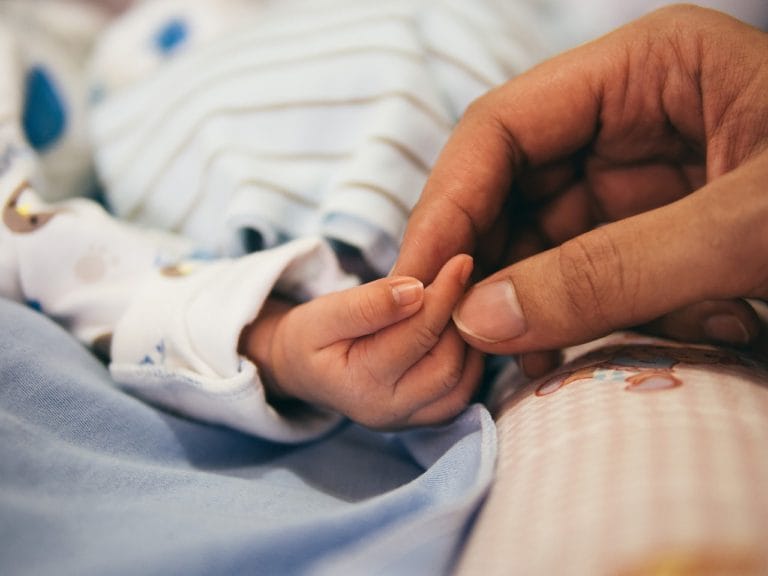Why Can't I Let People Hold My Baby? Postpartum Separation Anxiety
Why can’t I let people hold my baby? Postpartum separation anxiety can make it difficult for mothers to let others offer support in the weeks and months following birth.

You feel a pit in your stomach when your mother-in-law reaches for the baby. You nearly crawl out of your skin if the baby cries when you’re in the other room. It feels like you can’t breathe. Why can’t I let other people hold the baby? Why does it feel so unsafe to allow others to help out?
Fears around the baby’s wellbeing are a common symptom of postpartum anxiety
Of course, all new moms worry about and think about ways to keep the baby safe. They seem so fragile and you can’t bear to think of anything happening to them. However, if you find yourself physically ill, panicked or distraught when others step in to offer care to your baby, you may be dealing with postpartum anxiety. Postpartum anxiety can be very tricky since it feels really normal to be protective. But if you’re protective instincts make it difficult for you to rely on others or feel safe away from the baby, it may be postpartum anxiety. You can read more about postpartum anxiety here.
Why is my mama bear mode in overdrive?
Do you feel like a mama bear ready to pounce whenever well-meaning guests try to take the baby from your arms? Even worse, comments about you needing to “relax” or “let people help” make you feel misunderstood and full of anger? The postpartum hormones that kick on our protective instincts are an incredible evolutionary tool. They make sure that babies are protected in their most helpless state when they can’t survive on their own. However, for some moms, the hormones kick protectiveness into overdrive. This can lead mothers to develop compulsive cleaning or checking behaviors, fears of letting the baby out of their site or arms, and even fears of falling asleep.
Additionally, these protective instincts often feel incredibly natural. You don’t want to turn them off because something bad might happen to your baby. It’s often a loving partner or close relative that has brought up concerns about your “anxiety.”
I don’t want to be less protective
Of course, you want to do everything you can to keep your baby safe. You don’t want to “turn off” the very instinct that keeps your baby from harm. Postpartum therapy for postpartum anxiety can help you hang onto the useful parts of your protective nature without disrupting your sleep and overall well-being. Imagine if you could turn off the thoughts that keep you up at night and trust that your baby is safe. Or imagine if you could let your loving mother hold your baby and take a sweet and memorable photo without the feeling of gut-wrenching panic.
Sometimes, our anxiety can cloud our judgement and prevent us from enjoying these precious newborn moments. Many mothers look back on their early postpartum days and understand they were experiencing anxiety, but only months or years later. The anxiety can feel very natural and necessary, making it difficult to seek help. But postpartum therapy can help you hone your protective instinct and enjoy the time you have with your baby, all while getting much needed rest and self-care into your routine.
How can therapy help me?
Postpartum therapy will help you understand your anxiety, identify triggers, and develop coping skills. We really believe that your ability to regulate your emotions and manage your anxiety helps you become a better, more protective mother! You will never be judged or shamed for your anxiety in therapy. Your thoughts and feelings make sense when your brain is telling you to keep the baby safe! But we don’t want your brain to remain in “Fight or Flight” mode, constantly putting out fires. We also want you to benefit from some of the postpartum peace and bliss that these early weeks and months can bring. With a better understanding of your anxiety and how to cope, you can truly begin to see your baby as more than a fragile being in need of protection. You will be able to start to build that lifelong bond based on healthy nurturing and protection.
Postpartum therapy can help you feel like yourself again and enjoy your baby’s first few months in the world. With a skilled postpartum therapist, you can feel the fog of anxiety lifting. You don’t have to feel comfortable separating from your baby to get started. Babies are always welcome in our sessions! Call us today for a free 15 minute phone consultation. To learn more about Postpartum Therapy and how Skylands Wellness can help, click here.




